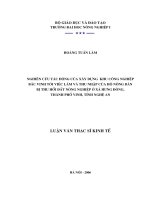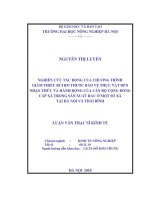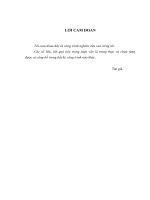Alcohol and you - Nghiên cứu tác động của rượu và cách phòng tránh
Bạn đang xem bản rút gọn của tài liệu. Xem và tải ngay bản đầy đủ của tài liệu tại đây (485.62 KB, 28 trang )
Mental Health NHS Foundation Trust
Birmingham and Solihull
Birmingham Healthy Minds
www.birminghamhealthyminds.org
Patient information leaet
Adult services
Alcohol and You
A self help guide
2
You may be interested in this booklet if
• You want to know more about drinking alcohol
• You are interested in what the current guidelines for safe limits are
• You think you may have a problem with your drinking
• People have told you that you have a drink problem
• You are worried about someone else’s drinking
What will this booklet do?
• Give you more information about different types of drinking
• Help you recognise your own pattern of drinking
• Help you decide what kind of drinker you are
• Describe how you might change if you want to
• Suggest how you might get further help
3
1. How do people use alcohol?
Most people in Britain drink alcohol. But different people use alcohol in
different ways. These are some of the typical ways people use alcohol.
Which of these people are you most like, in the way you
use alcohol?
Wayne enjoys a pint a couple of times a week. He tends to do this either
with his mates at their local pub, in the evening, or at family celebrations
such as birthday parties. He and his partner like to organise a baby sitter
once in a while and treat themselves to a meal with wine at a restaurant.
It is the company of his friends and family that Wayne enjoys. He’s not
that bothered about the alcohol, although he enjoys it when he does have
a drink.
If you are like Wayne then probably you are what health guidelines call a
Sensible Drinker. If you are otherwise in good health, then the alcohol you
drink should cause you no harm. But you may still nd this booklet helpful
to you. You will be able to check that you really are a sensible drinker. It
will also help you understand how and why you should continue to drink
sensibly.
Gemma likes to go out with her friends about twice a week. She usually
just has one or two drinks but sometimes nds she drinks a little more
than this. This tends to happen when she drinks with her friends in rounds
or during “happy hour” when the drinks are cheaper. She does not feel
she drinks too much. She accepts the occasional hangover without
concern. Recently, she has started having a glass of wine at home most
evenings.
If you are like Gemma then you might be surprised that you are what
health guidelines call a Hazardous Drinker. This means that while you are
unlikely to be actually causing harm to yourself right now, you are putting
yourself at risk. Your drinking is hazardous because you are putting
yourself at risk of having an accident or having serious health problems
in the long run. A hazard is an accident waiting to happen! In fact, if you
4
drink like Gemma, then probably there are days when you feel tired or
hung-over because of the way you use alcohol. If you are a Hazardous
Drinker, then using this booklet will help you return to being a Sensible
Drinker. You will then avoid the long-term risks to your health that too
much alcohol can cause.
John likes to have a drink on a regular basis. He goes to the pub most
nights and has at least 3 to 4 pints. Recently he has been having
arguments with his partner. She is not happy, both with the amount of
time he spends in the pub and the amount of money he spends when
he’s in there. Also, recently, he has had to take time off work when he
has been hung-over the following day. He is now nding it difcult to fall
asleep unless he has had a drink. He also nds he has to drink more to
get the same effect he once had from smaller amounts. His partner thinks
he has a problem and that it is getting worse, and it continues to be a
source of arguments.
If you are like John then you could be damaging your health right now.
Probably, you are drinking more alcohol than your body can cope with.
If that is the case, then you are what health guidelines call a Harmful
Drinker. You may not notice any effects at the moment, but over time
your body will have more and more difculty dealing with the alcohol
you are drinking. Your health will suffer. It might even be, looking back to
how you used to be when you drank less than you do now, that you do
notice some differences. You may feel bloated or have ‘tummy troubles’.
Perhaps you don’t feel as energetic as you used to. You may not sleep as
well or wake feeling as rested. Possibly you feel less happy, even low in
mood some days. If this sounds like you, then you should use this booklet
to help you cut down both how much and how often you drink. You’ll be
surprised how much better you feel if you do.
5
Mary feels she needs to drink every day. If she does not have a drink
she suffers from shaking, feeling sick, feeling anxious and sweating. She
recently lost her job due to her drinking and can only afford to drink the
cheapest brands. She drinks up to four litres of strong cider a day. She
has tried putting her rst drink of the day off for as long as possible, but
now nds it is getting earlier each day and is sometimes as soon as she
gets up. She thinks she is drinking too much and would like to change
but feels afraid of the feelings she has when she tries to cut down. She
knows she needs to talk to someone about her drinking and has thought
of making an appointment to see her doctor, but hasn’t yet done so.
If you are like Mary then you may nd it difcult to stop drinking alcohol.
You may begin to feel more unwell if you don’t drink than if you do. If that
is the case then you could be what health guidelines call a Dependent
Drinker.
If you believe that you are dependent on alcohol then it is very important
that you see your Doctor before you stop drinking.
Even if you are a Dependent Drinker, don’t worry. There is help available.
You can nd out how to get the help from this booklet.
But let’s not jump to conclusions! Before you nally decide what sort of
drinker you think you are, read more of this booklet and do one or two of
the exercises. Only then can you be clear what type of drinker you are.
More importantly, you’ll discover what you want to do about it and what
you can do.
6
2. What is alcohol?
Before we go any further, let’s be clear about what alcohol is. Alcohol
itself is a colourless chemical. It can be made from almost anything
that has sugar in it. For example, beer is made from barley, cider from
apples, wine from grapes, whiskey from grain, and vodka from potatoes.
Depending on what they are made from, and how they are made,
different drinks have different amounts of alcohol in them. Beer and cider
can be 2% to 7% alcohol; wines 9% to 15%; and spirits, like whiskey
and vodka, are often 40% alcohol. These percentages are ‘Alcohol By
Volume’. On bottles you may see this shortened to ‘ABV’ next to the
percentage number.
Alcohol is also measured in units. More and more drinks are labelled with
the units of alcohol they have in them. Here are some examples of the
typical number of units of alcohol in different drinks.
Alcohol also contains calories. There are about 55 calories in every unit
of pure alcohol. But remember, drinks have other ingredients besides
alcohol and they will add to the calorie count! The table below shows
roughly how many calories are in some popular drinks and mixes.
7
How many calories in…? Kcals Measure
Beer and Lager
Beer – canned and draught bitter 90 ½ pint
Beer – Lager (ordinary 3-4% ABV) 80-85 ½ pint
Beer – Lager (premium 5% ABV) 90 ½ pint
Beer – Draught Mild bitter 70 ½ pint
Beer – Brown ale 80
Beer – Bottled Stout 105
Cider – Dry 95 ½ pint
Cider – Sweet 110 ½ pint
Wine
Dry white wine 85 125ml
Medium white wine 95 125ml
Sweet white wine 120 125ml
Sparkling white wine
(Champagne, Cava )
95 125ml
Rose wine, medium 90 125ml
Red wine 85 125ml
Spirits 50 ml = pub double
Whisky, gin, vodka etc. 120 50ml
Premium whisky, gin, vodka 140 50ml
Liqueurs, brandy 150 50ml
Mixer
Tonic water 40 100ml
Cola 45 100ml
Caffeine based energy drink 45 100ml
Can of (slimline/diet) Tonic, cola etc 0 100ml
What drinks do you usually have?
8
How much of it do you usually drink on days when you are
drinking?
So how many units of alcohol do you usually have when you are
drinking alcohol?
Alcohol stays longer in women’s bodies than men’s. So women should
drink less alcohol than men.
If you are a woman, then you are increasing the risks to your health if
you regularly drink 3 or more units a day. If you are pregnant, you really
shouldn’t be drinking alcohol at all.
If you are a man, then you are increasing the risks to your health if you
regularly drink 4 or more units a day.
If you are drinking close to your limit, then two or three alcohol-free days
a week will keep you safer.
3. What does alcohol do?
Alcohol dissolves quickly in the blood stream and affects your judgement.
You may do things you wouldn’t do if you hadn’t drunk alcohol, and some
of these things you may later regret. It can cause unsteadiness and
loss of balance, slurred speech, and blurred vision. It can even lead to
unconsciousness and death.
The reason why you shouldn’t drive or operate machinery after drinking
alcohol is because it affects your judgement. It also affects your co-
ordination – that is, your ability to control your body, and your reaction
time slows down. It often does all this without you realising that it is
affecting you in these ways.
9
Your body treats alcohol as a poison. It works hard to get rid of it. But it
takes a healthy liver about one hour to get rid of 1 unit of alcohol. Fresh
air, black coffee, and cold showers won’t help to get alcohol out of your
system.
Effects of alcohol misuse
10
Regularly drinking large amounts of alcohol increases the risk of serious
illnesses. These include: inammation of the pancreas; stomach ulcers;
liver disease, including cancer; cancers of the mouth, throat and breast;
and brain damage.
It can also cause (and will certainly make worse) any mental health
problems, such as depression. Drinking large amounts of alcohol can also
lead to personal and social problems.
4. What kind of drinker are you?
To nd out what kind of drinker you are, think about the amount of alcohol
you drink and also the pattern of your drinking. The pattern of your
drinking is made up of the times when you drink alcohol and the times
when you do not, and who you drink alcohol with.
Think about how you used alcohol in the last week. Now ll out the diary.
Perhaps you cannot remember exactly what you had to drink last week,
or when. In that case, keep a diary in the coming week. Each day, record
on the sheet where, what, why and with whom you were drinking. In the
small boxes, put the number of units consumed in the session.
Drinking Diary
AM
PM
Eve
Where and with
whom/alone
Type of
drink
Units
£
spent
Mon
Tue
Wed
Thu
Fri
Sat
Sun
Total Units
11
How much money did you spend on alcohol in the week?
When you have completed your Drinking Diary, use it to help you answer
the following questions.
Questions
Scoring System
Your
score
0 1 2 3 4
How often do
you have a drink
that contains
alcohol?
Never Monthly
or less
2-4
times
per
month
2-3
times
per
week
4+
times
per
week
How many
standard
alcoholic drinks
do you have on
a typical day
when you are
drinking?
1-2 3-4 5-6 7-8 10+
How often do
you have one or
more standard
drinks on one
occasion?
Never Less
than
monthly
Monthly Weekly Daily
or
almost
daily
How often in
the last year
have you failed
to do what was
expected of
you because of
drinking?
Never Less
than
monthly
Monthly Weekly Daily
or
almost
daily
How often in the
last year have
you needed an
alcoholic drink in
the morning to
get you going?
Never Less
than
monthly
Monthly Weekly Daily
or
almost
daily
12
Questions
Scoring System
Your
score
0 1 2 3 4
How often in
the last year
have you had a
feeling of guilt
or regret after
drinking?
Never Less
than
monthly
Monthly Weekly Daily
or
almost
daily
How often in
the last year
have you not
been able to
remember what
happened when
drinking the
night before?
Never Less
than
monthly
Monthly Weekly Daily
or
almost
daily
Have you or
someone else
been injured as
a result of your
drinking?
No Yes, but
not in
the last
year
Yes,
during
the
last
year
Has a relative/
friend/ doctor/
health worker
been concerned
about your
drinking or
advised you to
cut down?
No Yes, but
not in
the last
year
Yes,
during
the
last
year
Add up the numbers in the right-hand column.
What is the total?
13
• If you scored up to 7, probably you are drinking sensibly.
• If you scored between 8 and 15, then your drinking is probably
hazardous. You are putting your health at risk.
• If you scored between 16 and 19, then your drinking is probably
harmful. Although you may not notice it, your health is suffering
because of the alcohol.
• If you scored 20 or more, then you might be alcohol dependent.
Now put the information together that you have learned about yourself.
My drinking is probably:
Sensible
Harmful
Hazardous
Dependent
If you are unhappy with the amount you drink, and believe you may be
a harmful drinker or a hazardous drinker then you should nd help in the
following pages.
If you believe that you are a dependent drinker then it is very
important that you see your Doctor before you stop drinking.
14
5. Why do you drink alcohol?
To get the most out of the help in the following pages, record all the
reasons why you drink alcohol. Some common reasons why people drink
alcohol are listed below. You may drink for reasons of your own. You
should add any of your own reasons at the end of the list.
Why I drink alcohol Yes/No
Because my friends do.
Because it helps me relax.
Because it helps me sleep at night.
Because it helps me stay calm when I’m mixing socially.
Because I get bored – it’s something to do.
Because I feel anxious if I go without alcohol.
Because I feel low in mood.
Because I like the feeling of being drunk.
Because it helps me to forget some things in my life that
cause me stress and make me unhappy e.g. debts; a
difcult personal relationship; problems at work.
Other reasons
15
Now think about what might be good about stopping drinking alcohol
or cutting down on the amount you do drink. Some of the advantages
of drinking less, or not at all, are listed below. You can also add other
good things of your own. In the right-hand column, number the top three
advantages for you of cutting down or even stopping your drinking. These
will be your top three reasons for reducing or stopping your drinking.
Advantages of stopping or reducing alcohol
My top 3
reasons
I’ll have more cash to spend on other things.
I’ll lose weight.
I’ll sleep better at night.
I’ll wake-up in a morning feeling refreshed.
I’ll feel happier and my mood will improve.
I’ll feel more in control.
I’ll look and feel healthier and tter.
I’ll get on better with my family and friends.
I’ll become much more relaxed.
Other reasons
16
6. What do you want to do?
You now understand a lot about your drinking. You know how much you
drink. You know when you drink. You know why you drink. You also know
what you will gain by reducing or stopping your drinking.
Do you want to continue drinking alcohol, but less of it and less
frequently?
Or do you want to stop drinking alcohol altogether?
Think about the consequences of continuing drinking in the way you do
now. What is good and what is bad about that? How would you see your
life in six months time?
If I continue to use alcohol like I do now
Advantages
What’s good about drinking?
Disadvantages
What’s bad about drinking?
How I see myself and my life in six months time if I continue drinking
17
Now think about reducing or stopping drinking. What will be good and bad
about that? How would you expect your life to be in six months time if you
reduced your drinking or stopped altogether?
If I reduce or stop my use of alcohol
Advantages
What’s good about drinking less or
not drinking at all?
Disadvantages
What’s bad about drinking less or
not drinking at all?
How I see myself and my life in six months time if I reduce or stop my
drinking?
Now come to a clear and honest conclusion about yourself and your
drinking, and what you want to do about your drinking.
I am a I want to
safe drinker
hazardous drinker
harmful drinker
dependent drinker
carry on
cut down
stop
18
Remember:
If you believe that you are a dependent drinker of alcohol, then it is very
important that you see your Doctor before you stop drinking.
7. How can you control your drinking?
The way you drink alcohol now is in part a habit. It is a habit that took time
to develop. Now you should take time to make new habits in the way you
use alcohol.
Planning
Begin to take control of your drinking by planning when and how much
you will drink.
• Use your Drinking Diary to plan when you will drink alcohol and how
much you will drink.
• Identify high-risk times i.e. times when you know that you might drink
too much e.g. on a night out with friends, at home after a hard day, on
Friday or Saturday nights.
• Pick at least two days a week when you will not drink any alcohol.
• On days when you plan to drink, pick the time when you will stop
drinking and leave the pub or bar, or the time when you will go to bed.
• On the days when you plan to drink alcohol, write down what types of
drinks you will have and how many. Try to work out how many units of
alcohol you will drink.
• Keep track of how much you really drink by recording what you
actually had next to what you planned to have.
• Plan to eat before you start drinking, and if possible eat while you are
drinking. This can help to reduce the effect of alcohol on your body.
19
Trimming
Begin to reduce the amount of alcohol you actually drink by trimming back
at the times you’ll least miss it.
• If you go out to drink, don’t have a drink at home beforehand.
• Try to eat before drinking alcohol. You will probably drink less if you
are full.
• Start drinking later in the evening, whether you drink at home or go out
to drink; set a time before which you won’t have an alcoholic drink.
• If you drink spirits, dilute them with a mixer (tonic, soda, ginger ale,
lemonade etc.) and increase the amounts of the mixer to make them
‘long drinks’.
• If you drink wine, buy small glasses rather than large ones and try
‘spritzers’ (mixing your wine with soda or lemonade). Try to drink lower
strength wines.
• If you drink beer or lager, stick to standard strength and avoid extra-
strength varieties or premium varieties.
Alternatives
Begin to reduce the time you spend drinking alcohol by looking for
alternatives.
• Pick one day a week when you usually drink alcohol and do something
else instead e.g. go to the cinema, go swimming or some other activity.
• If you tend to drink alcohol at home, experiment with non-alcoholic
drinks until you nd one that you enjoy. These may be cold soft drinks
such as zzy drinks, cordials or fruit juices. Or they may be hot drinks
such as tea, coffee, hot chocolate, cocoa, or malted drinks.
• If you tend to drink alcohol when you are out with friends, offer to
be the non-drinking driver so you have a good excuse ready for not
drinking alcohol.
• If you are drinking alcohol, alternate your alcoholic drinks with non-
alcoholic drinks. Remember many pubs now sell tea and coffee.
20
Particular problems
I am not drinking alcohol and…
• I feel anxious
Remember: Try relaxation or yoga. Practise slow, deep breathing. Use
calming thoughts, ignore anxious thoughts, and make a plan of your
time to keep busy. Distract yourself.
• I can’t sleep
Remember: Exercise regularly – but not late in the evening! Go to bed
and get up at a regular time. Make sure your bed and bedroom are
comfortable. Have a bedtime routine and wind down before going to
bed. Your sleep will improve once you reduce your alcohol intake and
follow these tips.
• I’m bored
Remember: Plan your day out so that you have something to look
forward to. Use the money you are saving on alcohol for something
special. Get in touch with supportive friends who won’t try to get you to
drink. Look for a new hobby or interest. Get on with some jobs that you
have not got round to.
• I’m stressed out and can’t relax
Remember: Relaxation and leisure time each day is important. Plan
your time and do one thing at a time. Eat a balanced diet. Talk things
over with a friend or family member. Set priorities and don’t be afraid to
say no.
• I’m out with friends but don’t feel part of the crowd
Remember: Try not focus on yourself. Think about those around you.
Ask what is going on in their lives, and listen to what is being said. You
do not need to keep up drinking with friends who are heavy drinkers;
that’s their choice and not yours. People will not dislike you just
because you are not drinking as much.
21
8. What is dependent use of alcohol?
There are some things that everybody should know about very heavy
drinking.
Continuous heavy drinking
Many people who drink very heavily every day do not eat properly. In
particular, they do not get enough Vitamin B. At the same time, the
body needs extra Vitamin B to repair the damage caused by alcohol. It
particularly needs Vitamin B to repair damage to nerve cells in the body,
including the brain. Very heavy drinking ushes vitamins out of the body.
So the very heavy drinker needs more Vitamin B than most people but
usually gets less. This leads to nerve damage. Many very heavy drinkers
rst experience damage to their nerves as ‘pins and needles’ in their
ngers and toes.
Very heavy drinkers may also experience being breathless when doing
ordinary activities, like walking upstairs. They may feel constantly tired.
And they may nd that they bruise very easily. This is because the alcohol
is damaging the blood cells that carry oxygen and other blood cells that
help stop bleeding.
Very heavy drinkers may also get diabetes because of damage to their
pancreas, which normally produces insulin. They may also damage their
liver, but they are unlikely to actually feel that damage being done.
If you experience any of these symptoms it is important you this discuss
this with your GP.
Suddenly stopping very heavy drinking
The body, and especially the brain, will adjust to cope with large amounts
of alcohol if the alcohol is present in the body all the time. That means
that the body, and especially the brain, has to readjust if the alcohol is
taken away.
22
If your body has adjusted to coping with continuous large amounts
of alcohol and then the alcohol is suddenly stopped then you may
experience the following:
• Shaking or tremors all over.
• Very heavy sweating.
• Extremely high blood pressure, and looking very red in the face.
• Vomiting and diarrhoea, and the only way to keep down any food will
be after drinking more alcohol.
• Very tense and agitated, being unable to settle down or do anything.
• Feeling very confused, not knowing the time, or where you are and
having a very poor short-term memory so that you cannot recall what
happened recently.
• Hallucinating: you may just ‘sense’ that bad things are happening, or
you may actually see or hear things that aren’t there; typically, people
in this state ‘see’ spiders, rats or snakes.
• You may suffer ‘ts’, during which you lose control of your body,
collapse, and become unconscious.
These are symptoms of physical withdrawal from alcohol. The symptoms
are very dangerous. They can be fatal. They can also lead to permanent
brain damage. The very heavy drinker can be left with no ability to lay
down new memories. It is a type of dementia specically associated with
very heavy drinking. It is caused by a lack of Thiamine, which is a type of
Vitamin B needed by the brain to make new memories.
Remember: if you believe that you are dependent on alcohol, then it
is very important that you see your Doctor before you stop drinking.
However with the right kind of help, anybody can come off alcohol
safely!
23
9. What about setbacks?
You might not have any set-backs! But if you do have a set-back it is
important not to give up on the goals you have set yourself.
A set-back can also be a good thing. It can be something you can learn
from. So if you do have a set-back, think about it afterwards. Was it
a difcult situation you found yourself in? Was it something you were
thinking about that caused you to feel bad or feel over-condent? What
was it that caused you to have the set-back?
Write it down, and plan how you will deal with that situation,
thought, or feeling next time. That way, you can try to avoid similar
set-backs in the future.
……………………………………………………………………………
Set-backs are a normal part of life. Remember that living life with much
less alcohol than you used to use, or even without any alcohol at all,
involves learning new habits. So for a time it’s easy to slip back into
old habits. If you slip back remember the goals you set yourself for
your drinking and try again. Read through this booklet again to remind
yourself. Given time, your new ways of behaving will become old, settled
habits themselves.
In moments of doubt just answer this question:
Do you want to control alcohol or do you want alcohol to control
you?
24
Useful Contacts:
Alcoholics Anonymous
Helpline: 0845 769 7555
www.alcoholics-anonymous.org.uk
PO Box 1, 10 Toft Green, York, YO1 7NJ
Information, advice and support to help people recover from alcoholism.
Alcohol Concern
Tel: 0800 917 8282
www.alcoholconcern.org.uk
Suite B5, West Wing, New City Cloisters, 196 Old Street, London,
EC1V 9FR
Works to reduce alcohol-related harm and to increase the range and
quality of services available to people with alcohol-related problems.
AL-Anon Family Groups UK and Eire
Tel: 020 7403 0888 10am - 10pm
www.al-anonuk.org.uk
Email:
61 Great Dover Street, London, SE1 4YF
Helps families and friends of alcoholics recover from the effects of living
with those with drinking problems.
Aquarius
Tel: 0121 414 0888
www.aquarius.org.uk
Email:
236 Bristol Road, Edgbaston, Birmingham, West Midlands, B5 7SL
For people concerned about their own or some else’s alcohol problem.
British Association for Counselling and Psychotherapy
Tel: 01455 883 316
www.bacp.co.uk
BACP House, 15 St John’s Business Park, Lutterworth, Leicestershire,
LE17 4HB
Offers an information service providing contacts for counselling in
England and Wales.
25
Down your drink
www.downyourdrink.org.uk
This site is designed to help you work out whether you’re drinking too
much, and if so, what you can do about it.
DrugScope
Tel: 020 7520 7550
www.drugscope.org.uk
Prince Consort House, Suite 204 (2nd Floor),
109/111 Farringdon Road, London, EC1R 3BW
Database of local drug and alcohol treatments and services across the
UK.
Drinkaware
Tel: 020 7766 9900
www.drinkaware.co.uk
Samuel House, 6 St Albans Street, London, SW1Y 4SQ
Provides information and resources on alcohol, the dangers of drinking
and tips to cut down intake.
Frank – Alcohol/Drug Information for young people
Tel: 0800 77 66 00
www.talktofrank.com
Advice and information about drugs.
Mind Infoline
Tel: 0121 608 8001
www.mind.org.uk
Provides information on a range of topics including types of mental
distress, where to get help, drug and alternative treatments and advocacy.
Also provides details of help and support for people in their own area.
Helpline available Mon - Fri, 9am - 5pm.
National Association for Children of Alcoholics
Helpline: 0800 358 3456
www.nacoa.org.uk
PO Box 64, Fishponds, Bristol, BS16 2UH
Addresses the problems faced by children growing up in families where
one or both parents are alcoholics or have a similar addictive problem.


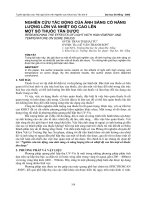
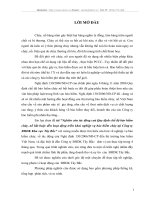
![[Luận văn]nghiên cứu tác động của lạm phát đến sản xuất và thu nhập từ nông nghiệp của cá hộ nông dân trên địa bàn huyện đông anh, thành phố hà nội](https://media.store123doc.com/images/document/13/gu/qx/medium_C8huED7IBF.jpg)
